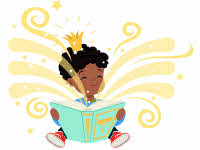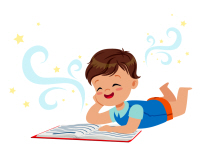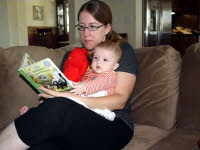
|

|

|
REadingADvantage, Inc.
Changing a generation - one child, one book at a timeLinks
|
Home About Us Objectives and Programs Partners and Volunteers Resources and Tools |
Resource SectionHere are some general resources to read about reading to children. We have a special section of resources for children with a parent in prison. The Videos Section lets you watch instead of read, and the Research Section has links to specific articles about the value of reading to a child. Contra Costa County Libraries, www.ccclib.org Project Second Chance, a program run by the Contra Costa County Libraries, offers free, confidential one-on-one basic literacy instruction to people who are over 16 years of age, out of school, and conversant in English. Half-Price Books, www.hpb.com First Book,
www.FirstBook.org Reading Rockets,
www.Readingrockets.org; Early Moments,
www.EarlyMoments.com; Reach Out and Read, www.ReachOutandRead.org Raising a Reader, from www.scholastic.com. First 5 California
has many resources for parents in the Parents Learning Center section of their website
including: Tandem, Partners in Early Learning. An organization devoted to reading to children. Resources for Children of Incarcerated ParentsThe Annie E. Casey Foundation has 36 selected resources to help parents, workers, and policymakers help kids stay connected to parents who are in prison. Family to Family California has a long list of scholarly papers on families with incarcerated parents. Children of Incarcerated Parents (PDF) was written for the National Conference of State Legislatures. VideosStill Face Experiment A psychologist and a mother demonstrate the importance of smiles and gestures on a baby. Trauma, Brain and Relationship: Helping Children Heal A psychologist discusses the effect of drugs, alcohol and stress on a baby while it is in the womb. Tips for Raising a Reader (First 5 California). The 30-million word gap on You Tube Just for fun: Sesame Street - Read Me a Story. (Big Bird sings) Hear Anne Fernald, Ph.D.,Director of Center for Infant Studies at Stanford University discussing the importance of language development. A Window To The World: Promoting Early Language and Literacy Development This one is about children from 0 - 3 years old. Research SectionThese are scholarly research papers on the value of reading to children, and the disparity between children of different income levels. Each link opens a new page. Here's a paper from the ECEC
(Early Care and Education Consortium). It tells us that reading aloud to infants
and toddlers promotes early language and literacy skills. (PDF, 855 KB)
Reading physical books to kids makes parents more affectionate than reading on a tablet.
A study at Stanford
finds that the gap between vocabularies of children from rich families
and poor ones has narrowed since 1998.
ReadAloud.org's Dr. John S. Hutton is a pediatrician, a researcher,
an author, a children's bookstore owner and a father of three. This video
tells you the benefits of reading aloud to your child(ren) for just
15 minutes a day.
An inspiring conversation with U.S. Secretary of Education Arne Duncan and Ralph Smith,
managing director of the Campaign for Grade-Level Reading. The page has links to a
recording of the webinar, and another to the slides they used in the presentation.
The Huddle has some very scholarly research articles. The rest of their web site
is for members only, with membership limited to those who the administrator approves,
so don't click on "About us". It is a part of the Campaign for Grade Level
Reading.
An Indiana University study suggests that children encounter 70% more unique words
while reading picture books than they do within everyday conversation, which leads to
a richer early vocabulary. This makes sense when one considers that each book is a
story about a different topic. Many of the words used in ocean-based The Adventures
of Miki the Narwhal, by Joseph Pro, may not come up frequently in conversation for
a young family in landlocked Sacramento!
3rd Grade Reading Success Matters: As early as 18 months, low-income children
begin to fall behind in vocabulary development and other skills critical for school
success. Parents play an enormous role in closing this gap, as do daycare providers,
pediatricians, preschools programs, and the broader community.
Public housing authorities pilot education programs: Read how, in an effort to
improve literacy rates among children from low-income families, public housing
authorities across the state are piloting programs that help parents prepare their
children for school and increase their access to books.
Early Grades Crucial in Path to Reading Proficiency:
Children who are not reading proficiently by 3rd grade are widely seen as being in
academic crisis. Educators are increasingly looking for actions they can take in
the younger grades - even as early as preschool - to head off failure later in
a child's school career.
Eyes on the Early Years, a newsletter devoted to early education. The August 2015 edition
has a particularly good article, "Better vocabulary skills at 24 months tied to greater math,
reading and behavior skills in kindergarten".
Equity in Preschooling. The US Department of Education finds a wide disparity
is the availibility and quality of preschoooling.
Mexican-American children lag behind their anglo peers by age 2 in language skills, a study
finds. (Their social and emotional skills are just fine, though.)
Teachable moments
Stanford University Language Learning Lab
Read aloud to your infants from birth,
Language Gap between Rich and Poor (Stanford University). This is 2013 research article
about a Stanford study that shows the language gap between rich and poor begins in Infancy.
Research by Stanford psychologists reveals that 2-year-old children of lower-income families
may already be six months behind in language development. The 30-million Word Gap. (PDF) Childhood Poverty
No Rich Child Left Behind
Beat the Summer Slide
Startling (and heart-breaking) Statistics
Empowering our children by bridging the word gap
The Word Gap |

